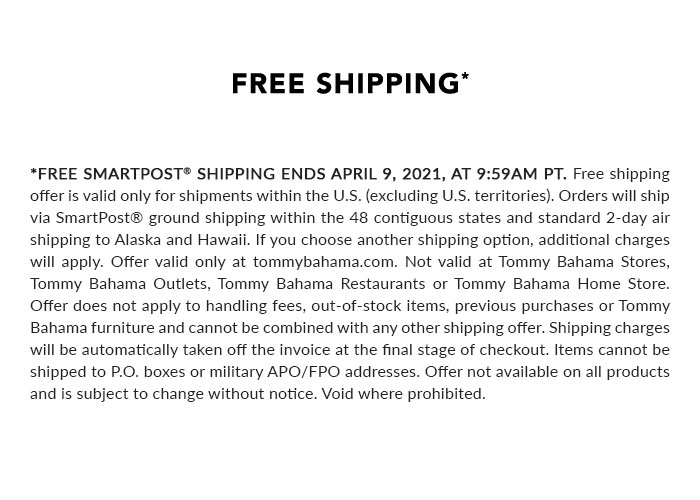

Sign up to receive information about Tommy Bahama products, events, offers and more. Unsubscribe at any time. By signing up you agree to our Terms of Use and Privacy Policy.
† U.S. only. Restrictions apply.![]() Earn a $50 Award for Every $175 You Spend See Details
Earn a $50 Award for Every $175 You Spend See Details

Final Hours! Free Expedited Shipping on Orders $150+ Ends at 10am ET/7am PT See Details


Sign up to receive information about Tommy Bahama products, events, offers and more. Unsubscribe at any time. By signing up you agree to our Terms of Use and Privacy Policy.
† U.S. only. Restrictions apply.Enjoy Free Returns See Details
In 2010, California passed a law requiring companies to disclose what they are doing to address slavery and human trafficking in their supply chains. Referred to as SB 657, the California Transparency in Supply Chains Act seeks to "educate consumers on how to purchase goods produced by companies that responsibly manage their supply chains."
Slavery is defined as "the act of holding an individual against his or her will and controlling that individual physically or psychologically by violence or its threat for the purpose of appropriating that individual's labor." Human trafficking is defined as "the obtaining, harboring, or transporting of a person from one area to another for the purpose of forcing them into slavery."
Tommy Bahama manages its supply chain carefully and continually assesses its suppliers' compliance with its high standards for legal and ethical conduct, which include, among other things, zero tolerance for slavery and human trafficking.
Tommy Bahama has adopted a Business Partner Code of Conduct that addresses, among other things, the issues of slavery and human trafficking and which apply to our direct suppliers. Our direct suppliers are evaluated on their compliance with this Business Partner Code of Conduct through on-site audits performed by our in-house compliance audit team. Confidential interviews between our in-house compliance audit team and our supplier's employees are a key component of the auditing process, as is the review of, among other things, compensation records, working hours and hiring practices.
Tommy Bahama's product purchasing agreements require all suppliers to comply with all applicable laws regarding slavery and human trafficking.
Tommy Bahama maintains and enforces internal accountability procedures for employees and contractors. If any evidence is found suggesting that slavery or human trafficking may be present, we will act accordingly. Any instances of non-compliance that are not resolved to Tommy Bahama's satisfaction, could, among other things, result in the termination of the employee or contractor.
Tommy Bahama conducts internal training on our Business Partner Code of Conduct to ensure that the employees who work with our supply chain are aware of the issues surrounding human trafficking and slavery, and that processes are implemented internally to mitigate this risk.